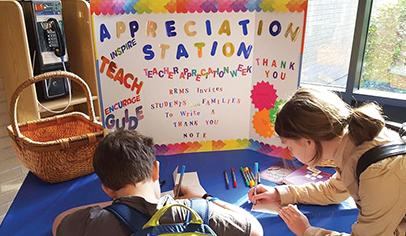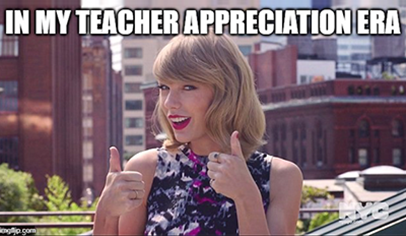A few years ago, Liz Gardner’s worst nightmare was speaking into a microphone at a PTO meeting. The mother of two overcame her fear of speaking to groups, and this summer she presented her plan to raise parental involvement in academics to the Kentucky commissioner of education.
Kathy Staub in Manchester, N.H., has a similar story. By her own admission, she was once an ordinary, mild-mannered PTA president. Now she’s speaking out at school board meetings and motivating parents across the city to get involved in school.
Both women filled traditional parental roles at their children’s schools for years, but wanted to do more. They learned how through parental involvement education programs. These range from monthly workshops to intense yearlong programs, all with an aim to engage parents in academics. As schools across the country work to implement reforms under the No Child Left Behind Act, even more organizations are forming to recruit parents in the effort.
Leadership Training
Liz Gardner has always been active in her children’s school, but in the past she usually helped with fundraisers and went to meetings. This year she’s analyzing the school’s standardized test scores, pinpointing weaknesses, and showing parents how to help their children improve.
Gardner learned how through the Commonwealth Institute for Parent Leadership, a nonprofit that offers intensive training programs to 200 parents in Kentucky each year. Parents in the program learn to evaluate test scores and design programs to raise scores in their school’s weakest area.
Although CIPL only serves parents in Kentucky, its sponsoring organization, the Prichard Committee for Academic Excellence, recently launched a group to work in other states, Parent Leadership Associates.
When Gardner examined the test scores for Perryville Elementary School in rural Perryville, Ky., it was clear that students had the greatest room for improvement in writing. In the 2001-2002 school year, only 1.92 percent of fourth grade students scored in the “proficient” category in writing. None of the students scored in the “distinguished” category.
Perryville is a small town where the community turns out in great numbers to support school programs, Gardner says, but it’s more common for a parent to bring cupcakes to school than to become involved with academics.
As a CIPL fellow, she designed a plan to address students’ low writing scores and to enlist parents in the effort. When kids go back to school this fall, their parents will be able to learn about state standards and improve their tutoring skills at the Parent Welcome Resource Center.
The center will be equipped with donated computer equipment, educational computer games, and flash cards with tips on helping kids with homework. That can be especially helpful in a community where parents support the school, but many can’t afford to buy flash cards to help their children study at home. Gardner applied for and received $4,500 in grants to fund the center. The Perryville Elementary Parent Teacher Association and the state Family Resource Center contributed another $3,000 to the effort.
In three two-day training sessions, Gardner learned the ins and outs of the Kentucky education system, which has undergone heavy reform in the last decade. She went through the CIPL program with a group of 18 parents, including grandparents, retirees, teachers, women with Ph.D.s, and other stay-at-home moms like herself. The training included lessons in educational lingo such as “rubric” and “accountability index.”
“We’re in a more rural school,” Gardner says. “The average parent doesn’t know what that (rubrics) is. We’re breaking it down into everyday English.”
Throughout the year, the center will hold workshops to help parents understand how students are taught writing, what student writing portfolios should include, and how state tests score writing samples. At the end of the year, a writing portfolio night will feature writers from the local newspaper and perhaps a children’s book author. PTO members will help with events, as will the school’s AmeriCorps and VISTA volunteers.
While the Parent Welcome Resource Center will concentrate on writing for the first year, it can change its focus each year to work on the areas where students had the lowest test scores.
Gardner’s short-term goal is to raise the level of students scoring as proficient and distinguished to 16 percent in the 2004 testing cycle. The state goal is for all schools to reach 100 percent proficiency in all subject areas by 2014.
She’s not doing it alone. Perryville Elementary’s school-based decision-making council is also working to help parents understand what proficiency on the standardized tests means. The group will hold an orientation for each grade level to explain the standards and expectations for that grade, says Principal Betty Montgomery.
“They seem to feel that the teachers are experts and should handle the academics,” Montgomery says. “The teachers want the parents to be involved but have not made intentional efforts to encourage participation on a regular basis. We have realized that we need to take the relationship a step further and make intentional efforts to involve parents as academic partners on a regular basis.”
Gardner worked at home providing childcare after her children were born, but stopped at the end of the spring semester to focus more time on her CIPL project. Her son Zachary is entering the second grade and son Tyler will be in kindergarten.
“I used to be really shy, believe it or not,” Gardner says after launching into a discussion of her plans for the upcoming school year. “It’s given me a great sense of confidence.”
It’s a big change for a woman who says she was booted up to become PTO president against her will. Gardner served as fundraising chair of the Perryville Elementary PTO, and then volunteered to serve as vice president in the 2001-02 school year. When the candidate for president withdrew her name, Gardner was drafted to serve.
“At the time I thought fundraising was the role that parents played,” Gardner says. “I didn’t realize how much more there was for us to do.”
She hopes to change that with the Parents in Education, or PIE incentive program. Parent volunteers will have an 8-inch-diameter pie chart and will receive a construction paper pizza slice each time they volunteer. When they complete the pie they will receive coupons for free pizza. The PWRC will encourage parents to make at least four of those volunteer activities tied to academics. A “Helping Hands” bulletin board outside the center will keep parents informed of volunteer opportunities and feature a volunteer of the month, who will receive a free dinner and movie pass.
For many of the more than 1,000 parents who have gone through the CIPL program in the last six years, becoming more involved in their local school is just the first step. More than 450 participants have served on school-based decision-making councils, and 21 have gone on to hold seats on their local school board.
Parent Leadership Exchange
Kathy Staub’s involvement in her children’s schools started with the PTA and grew to include school board meetings, candidate forums, and board of alderman meetings in Manchester, N.H.
Through her involvement with the Institute for Responsive Education she is helping other parents get more involved in school. An IRE program called the Parent Leadership Exchange trains parent leaders in New England and provides a forum for parents to compare notes.
Staub’s son is in third grade at McDonough Elementary School and her daughter, an eighth-grader, also attended the school. Parents frequently came out in droves for PTA ice cream socials at the Manchester school, but when the Title I social worker held programs just a few parents attended.
A few PTA members sat around talking on a porch during summer break about what they’d like to see change at the school. Parents wanted to know more about what their kids were learning, to have more access to the school, and to have more input into decisions made at the school. They formed a parent involvement committee called Parents as Partners, and parents attended a series of free workshops offered by the New Hampshire Department of Education.
At the same time, Staub helped organize the Manchester Coalition for Quality Education, which included parent leaders from 13 schools, to deal with citywide education issues. Staub was its first president.
She was motivated by the chronically leaking roof at McDonough Elementary. Repairs at McDonough and several other schools were repeatedly bumped from the city’s capital improvement budget.
Staub and other parents gathered almost 600 signatures on a petition calling for the Manchester School Board and Board of Alderman to address school facilities. “We just went to the board of alderman meetings and just hammered them,” she says.
She has also campaigned for a school bond issue and questioned school board candidates at a pre-election forum.
MCQE organized a First Grade Night at McDonough Elementary, at which two first grade teachers demonstrated to parents of Title I children how they teach math and reading. Twenty parents attended the first event. The second year, 35 parents showed up. Kids ate pizza and played in the gym during the program. This year, as the school becomes a schoolwide Title I school, any parent of a child at McDonough will be able to attend.
“The Title I social worker said, ‘I’ve never seen so many parents come out for something that wasn’t a party,’ ” Staub says.
Another Step
Staub met Linda Peterson, vice president of the Boston-based Institute for Responsive Education, at a Parent Leadership Exchange workshop, and Peterson offered to hold workshops in Manchester with MCQE as the sponsor. Parent Leadership Exchange held three workshops in Manchester last school year, with such topics as making schools welcoming to parents and connecting family involvement in schools to student learning.
Changing the school culture must be a deliberate process, Peterson says. “Those schools that have not had the opportunity to explore parent involvement still have the fear that parents can be equated with problems,” she says.
A Little Feedback
At McDonough School a new principal has instituted a monthly coffee hour to receive input from parents and have the kind of back and forth that’s not possible at the structured PTA meetings. The experience of being listened to and effecting change in the school has been empowering for McDonough parents. This winter, about a dozen parents were meeting with the principal during the coffee hour and complained about tall snow banks on the street that reduced visibility for drivers and students crossing the street. The principal left to make the morning announcements, and Staub told parents how to contact the alderman for the ward.
“When he came back every parent had the name and number of the alderman, and the snow banks were gone within two days,” Staub says.
MCQE has applied for a grant to increase parental involvement in 13 schools in Manchester. The group plans to survey every parent in the school district, hold more workshops, and organize a district-wide parent involvement summit in fall 2004.
“When you focus on the kids and what the ultimate goal is for the kids, and not the institution of the school, that’s when you get the parents involved,” Staub says.
Staub quit her part-time job in February to focus on campaigning for the bond proposal and to write grant applications for MCQE. “Already I have seen changes in the language people use regarding parent involvement, and I see attitudes beginning to change,” Staub says. “We are overcoming the inertia.”
Parent Involvement Tips
Parent involvement can be as little as recognizing good learning practices and making sure your children do their homework, says Linda Peterson of the Institute for Responsive Education.
More active involvement begins with finding what your school needs.
A school that is struggling financially and has poor test scores has vastly different needs than a school where children are excelling on tests and funding is secure. Talk to teachers and administrators about the school’s greatest need, then find a way to contribute.
Read the school report card, which is required under the No Child Left Behind Act, and discuss it with the principal. Ask what is being done to improve student achievement, and how parents can help with that effort. Most of all, remind staff members that you are willing to help.
Consider setting up your own parent involvement education program. Any school or school district can put together its own parental involvement program, Peterson says.
Start by networking with other schools in the district, or even outside of the school district, to see what has worked for them. “It’s gratifying to see that someone else is going through the same things you are and having the same problems,” Peterson says.
Investigate local resources for parental involvement. Contact the National Coalition for Parental Involvement in Education to find federally funded Parent Information Resource Centers in your area.
Contacts
- Center for Parent Leaderships: www.centerforparentleadership.org
- National Coalition for Parental Involvement in Education: www.ncpie.org
- Parent Information Center: www.parentinformationcenter.org
- Commonwealth Institute for Parent Leadership: www.cipl.org
























